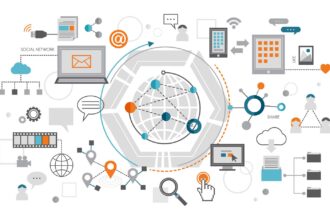In today’s digital era, mobile applications have become an integral part of our daily lives. From ordering food to managing finances, there seems to be an app for almost everything. However, as technology evolves and user expectations continue to rise, the landscape of app development is constantly changing. In this blog post, we’ll delve into the top trends that are shaping the future of app development, exploring how they are revolutionizing the way we interact with mobile devices and the services they offer.
5G Technology
One of the most significant advancements in recent years is the rollout of 5G technology. With its unparalleled speed and low latency, 5G is set to transform the mobile app experience. Developers now have the opportunity to create more immersive and data-intensive applications, such as augmented reality (AR) and virtual reality (VR) experiences, without worrying about connectivity issues. This opens up new possibilities for industries like gaming, healthcare, and education, where real-time interactions and high-resolution content are crucial.
Artificial Intelligence and Machine Learning
AI and machine learning have already made their mark in various industries, and app development is no exception. From personalized recommendations to intelligent chatbots, AI-powered features are enhancing user experiences and driving engagement. According to the team behind Sonin, developers are leveraging machine learning algorithms to analyze user behavior, predict preferences, and automate tasks, ultimately making apps smarter and more intuitive. As these technologies continue to evolve, we can expect to see even more sophisticated applications that adapt to users’ needs in real time.
Internet of Things (IoT) Integration
The proliferation of IoT devices is creating new opportunities for app developers to create seamless connected experiences. Whether it’s controlling smart home appliances, monitoring health metrics with wearable devices, or tracking assets in logistics, IoT integration is becoming increasingly prevalent in app development. Developers are building applications that can communicate with a wide range of IoT devices, enabling users to manage and interact with their surroundings effortlessly. As IoT ecosystems continue to expand, the demand for IoT-enabled apps is expected to grow exponentially.
Progressive Web Apps (PWAs)
Progressive web apps are a hybrid approach to app development that combines the best of web and mobile technologies. Unlike traditional native apps, PWAs are built using web technologies like HTML, CSS, and JavaScript but offer functionalities similar to native apps, such as offline access, push notifications, and device hardware integration. This makes PWAs lightweight, fast, and accessible across different platforms and devices without the need for separate installations. As businesses seek cost-effective solutions with a broader reach, PWAs are gaining traction as a viable alternative to native app development.
Cross-Platform Development
With the multitude of devices and operating systems available in the market, cross-platform development has become essential for reaching a wider audience. Frameworks like React Native, Flutter, and Xamarin allow developers to write code once and deploy it across multiple platforms, saving time and resources. This approach not only streamlines the development process but also ensures consistency in user experience across different devices. As the demand for multi-platform apps continues to rise, cross-platform development is becoming the norm rather than the exception.
Enhanced Security Measures
As mobile apps handle sensitive user data, ensuring robust security measures is paramount. With the increasing number of cyber threats and privacy concerns, developers are focusing more on implementing stringent security protocols throughout the app development lifecycle. This includes encrypting data transmissions, implementing two-factor authentication, and regularly updating software to patch vulnerabilities. By prioritizing security from the outset, developers can build trust with users and protect their valuable information from potential breaches.
Voice-Enabled Interfaces
Voice technology has gained widespread adoption with the rise of virtual assistants like Siri, Alexa, and Google Assistant. As a result, voice-enabled interfaces are becoming an integral part of app development, allowing users to interact with applications using natural language commands. From voice-activated search to voice-controlled navigation, developers are integrating voice recognition capabilities into their apps to enhance accessibility and convenience. This trend is particularly significant in sectors like automotive, healthcare, and retail, where hands-free interactions are essential.
Low-Code/No-Code Development
Traditional app development processes can be complex and time-consuming, requiring specialized skills and expertise. However, with the emergence of low-code/no-code development platforms, the barrier to entry has significantly lowered. These platforms enable users with little to no programming knowledge to create functional apps using visual interfaces and pre-built components. By democratizing app development, low-code/no-code platforms empower businesses and individuals to bring their ideas to life quickly and cost-effectively.
In conclusion, the future of app development is incredibly exciting, with rapid advancements in technology reshaping the way we conceive, design, and interact with mobile applications. From leveraging emerging technologies like 5G, AI, and IoT to embracing innovative development approaches like PWAs and cross-platform development, developers have an array of tools and strategies at their disposal to create compelling and impactful apps. By staying abreast of these trends and continuously adapting to the evolving landscape, developers can seize opportunities and deliver cutting-edge experiences that delight users and drive business success in the years to come.











